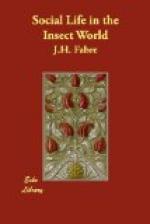The Great Peacock exists as a butterfly only to perpetuate itself. It knows nothing of food. While so many others, joyful banqueters, fly from flower to flower, unrolling their spiral trunks to plunge them into honeyed blossoms, this incomparable ascetic, completely freed from the servitude of the stomach, has no means of restoring its strength. Its buccal members are mere vestiges, useless simulacra, not real organs able to perform their duties. Not a sip of honey can ever enter its stomach; a magnificent prerogative, if it is not long enjoyed. If the lamp is to burn it must be filled with oil. The Great Peacock renounces the joys of the palate; but with them it surrenders long life. Two or three nights—just long enough to allow the couple to meet and mate—and all is over; the great butterfly is dead.
What, then, is meant by the non-appearance of those whose antennae I removed? Did they prove that the lack of antennae rendered them incapable of finding the cage in which the prisoner waited? By no means. Like those marked with the tonsure, which had undergone no damaging operation, they proved only that their time was finished. Mutilated or intact, they could do no more on account of age, and their absence meant nothing. Owing to the delay inseparable from the experiment, the part played by the antennae escaped me. It was doubtful before; it remained doubtful.
My prisoner under the wire-gauze cover lived for eight days. Every night she attracted a swarm of visitors, now to one part of the house, now to another. I caught them with the net and released them as soon as captured in a closed room, where they passed the night. On the next day they were marked, by means of a slight tonsure on the thorax.
The total number of butterflies attracted on these eight nights amounted to a hundred and fifty; a stupendous number when I consider what searches I had to undertake during the two following years in order to collect the specimens necessary to the continuation of my investigation. Without being absolutely undiscoverable, in my immediate neighbourhood the cocoons of the Great Peacock are at least extremely rare, as the trees on which they are found are not common. For two winters I visited all the decrepit almond-trees at hand, inspected them all at the base of the trunk, under the jungle of stubborn grasses and undergrowth that surrounded them; and how often I returned with empty hands! Thus my hundred and fifty butterflies had come from some little distance; perhaps from a radius of a mile and a quarter or more. How did they learn of what was happening in my study?
Three agents of information affect the senses at a distance: sight, sound, and smell. Can we speak of vision in this connection? Sight could very well guide the arrivals once they had entered the open window; but how could it help them out of doors, among unfamiliar surroundings? Even the fabulous eye of the lynx, which could see through walls, would not be sufficient; we should have to imagine a keenness of vision capable of annihilating leagues of space. It is needless to discuss the matter further; sight cannot be the guiding sense.




